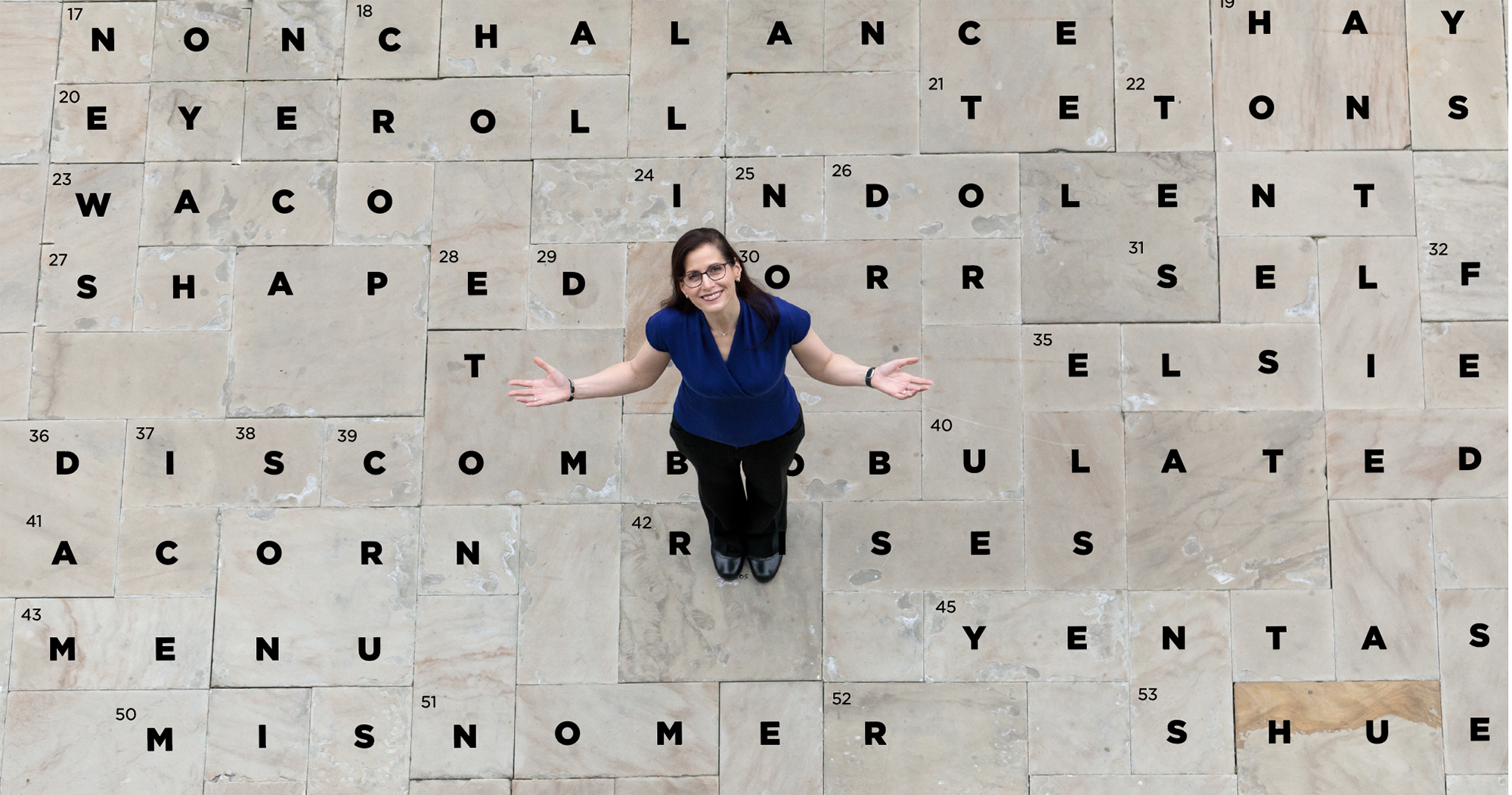
Provost Katherine Baicker’s father taught her to solve the New York Times crossword when she was a kid, starting with the easier early week puzzles—in pen, of course—and working her way up. (Photography by John Zich)
UChicago’s provost is proud to be a published author—of several crossword puzzles.
When Katherine Baicker became the University of Chicago’s 15th provost in March of this year, she brought a stellar résumé to the job.
An expert on the economic analysis of health care policy, Baicker has directed influential research projects and served on the White House Council of Economic Advisers. Her articles appear in top medical and policy journals, and she is often quoted in the national media on Medicaid expansion, universal health care, and more. In 2017, after a distinguished decade at Harvard, she joined the UChicago faculty as the Emmett Dedmon Professor and dean of the Harris School of Public Policy.
Still, Baicker, a lifelong crossword puzzle enthusiast, may be proudest of the fact that the New York Times published two of her creations this past spring (April 17 and May 16). Since she began constructing puzzles in January 2021, more than a dozen of her crosswords have graced the breakfast tables of readers of the Boston Globe, the Wall Street Journal, and other newspapers. (And, yes, she has added these prestigious new publications to her CV.)
Baicker remembers her dad teaching her to solve the Times crossword when she was a kid. Like most beginners, she started with the easier Monday and Tuesday puzzles and worked her way up to the tougher ones that appear later in the week. In adulthood, crosswords have continued to be “a great evening wind-down activity for me when I’m ready to put work aside,” Baicker says.
The leap from puzzle solver to constructor came during the COVID-19 pandemic, when Baicker—then dean of Harris Public Policy—had more free time at home in the evenings. “I’d always thought that I would enjoy constructing puzzles, but I didn’t really know how to do it,” she says. “I thought, OK, now’s my moment.” To learn the ins and outs (downs and acrosses?) of puzzle making, Baicker reached out via email to potential coaches in the “crossworld” community.
One early mentor, crossword constructor Ross Trudeau, warned Baicker that the puzzle submission process would involve rigorous evaluation, revisions, and likely rejection. He encouraged her to aim high, send her first attempt to her first-choice newspaper, and prepare to wait six to 12 months to see it published—if it was accepted. “And I had to laugh and say, ‘Stop. This I understand,’” Baicker says. “It sounds exactly like academic publishing!”
Puzzle making is often collaborative, and Baicker has constructed several crosswords with more experienced cruciverbalists. Brainstorming on Zoom and sharing ideas in a Google doc, she and Scott Earl, a nonprofit executive, have coconstructed three puzzles. Along with “fun and levity,” Earl says, Baicker brought creativity and leadership to the process: “She’s really good at email, so she helped me keep to some deadlines and make sure we were working toward a finished product.”
Baicker says that getting paid for the work added a thrill to making new friends and seeing her name above the grid. “I was so excited to be able to say, ‘I am a professional crossword puzzle constructor.’” Still, the Yale- and Harvard-educated economist won’t be quitting her day jobs anytime soon. Payment for a puzzle was barely more than the cost of crossword-creation software.
In the words of Times crossword editor Will Shortz, “good crosswords connect to everything in life,” and Baicker sees some commonalities between her vocation and her avocation. “I learn new things when I do the puzzle—new cultural references, new people, new facts, new connections between words,” she says. Serving as the University’s chief academic officer also requires intellectual curiosity. “It’s part of my job to learn about the fascinating work that people are doing, from astronomy to art history to zoology and everything in between.”
Baicker has dedicated her own research career to leading large pathbreaking projects that seek to solve some of the thorniest problems in health care economics. Her scholarship focuses on public and private health insurance, and as co–principal investigator of the Oregon Health Insurance Experiment—a randomized study of the effects of Medicaid coverage—she published findings that influenced national policy. This past February she coauthored an article in JAMA Health Forum that outlines a blueprint for redesigning the US health care system to create affordable universal coverage.
Given the complexity of such challenges, it’s no surprise that Baicker sees crosswords as a mental break. “Crossword puzzles fit neatly in a predetermined grid, there are conventions that are almost never violated, and there’s a certain elegance to the perfect interlocking of things that is not like life,” she says.
Although as provost she has less time for research and crossword construction, Baicker still solves weekday puzzles on the Times app and does the Sunday puzzle on paper, “over coffee and breakfast,” she says, and “naturally, in ink.” After her first puzzles were published, she was delighted when several UChicago-connected constructors reached out to congratulate her. Time permitting, she says, “I hope that I will be able to collaborate with them in the coming years.”
Until then, Baicker’s side hustle gives her a simpler topic to talk about at family gatherings than health care economics or university administration. “Nobody knows what provost-ing is,” she says with a laugh. “But everyone knows about crossword puzzles.”
